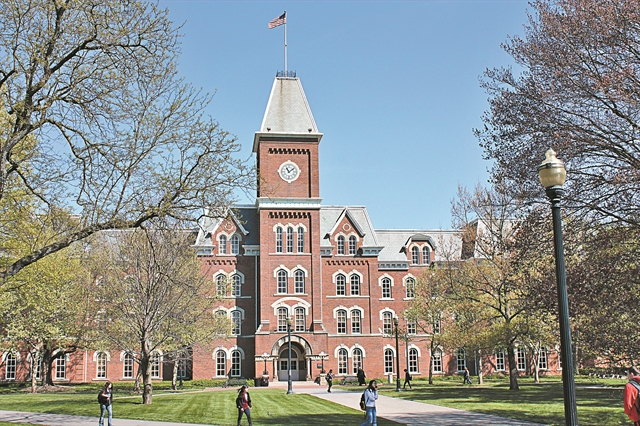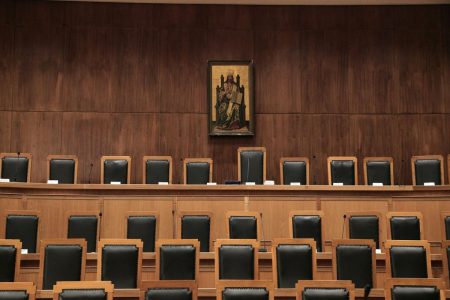By Marni Papamatthaiou
The viability of Modern Greek Studies programmes at universities around the world has been an issue for decades.
How can about 200 programmes for the teaching and dissemination of Greek language and culture – 65 of them incorporated in the classics departments of universities – survive when the Greek state does nothing whatsoever to support them?
In the US, which is the citadel of Modern Greek studies around the world, citizens and professors have undertaken a particular brand of activism that demonstrates that Hellenic culture, which historically reached all corners of the known world, still has its own way of surviving and spreading its wings.
It is supported by diaspora communities, private donors, and active members of the younger generation.
The Modern Greek Studies programme at Ohio State University is a case in point.
“Let’s talk about the meaning of Greek-American culture. Modern Greek Studies programmes are dynamic loci of that culture as they not only have high-level educational programmes but also act as a vehicle for the transmission of values to society. They constitute a vital space of cultural democracy,” Yorgos Anagnostou, the director of the programme, told To Vima.
Emphasis on innovation
Founded in 1870, Ohio State is one of the largest and oldest public universities in the US and has about 60,000 students and an endowment of seven billion dollars. It is ranked among the twenty top public universities and is among the 12 top universities in research in the US. It recently placed among the top universities in terms of innovation. It boasts 12,000 programmes in 18 faculties and has 200 different academic centres and institutes.
Anagnostou and his distinguished colleague Professor Grigoris Tzousdanis run a department which teaches Modern Greek culture and language. Each year about 150 students enroll in the programme which has operated since 1975 and has trained hundreds of students over the decades.
The education of second and third-generation Greek-Americans is a key part of its mission and it has done distinguished work in Greek diaspora studies.
“Greek-Americans are proud of their link to the ancient Greek ideal of democracy. They need not go far away to experience one of its contemporary expressions in the way in which Modern Greek scholars teach and transmit our culture,” Anagnostou said.
Despite a resurgence of classical studies – after the hegemony of applied sciences and artificial intelligence globally and of the issues that they raise – the economic crisis continues to hinder the expansion of Greek studies programmes.
“The answer has been found in private donations. In the US important chairs are supported by donations either from private individuals or from institutions, communities, and cultural groups. That could also be done at Greek universities as the law allows it, but it is not encouraged or accepted, because universities are often at the mercy of hooded youths and minorities of upstarts,” he added.
Hence, research on and the teaching of Greek culture abroad is alive and well. A key focus is the need for contact with local communities in the cities in which the university programmes are located and the more general need to coordinate funding and to determine their curriculum.
The creation of a central coordinating organ for Greek studies abroad is considered crucial by many.
A programme that has earned distinctions
The Modern Greek Studies programme at Ohio State University has repeatedly earned distinctions, has contributed to the study of Greek literature and its relationship with society, and is staffed with distinguished scholars whose work is recognised internationally.
Today, it is the sole Modern Greek Studies programme in the US with full-time professors who research the Greek diaspora and the Greek-American community in particular.
A unique feature of the programme is the Laboratory for Greek Dialectology in Ohio State’s Linguistics Department, headed by internationally renowned linguist Brian Joseph – who aside from his specialisation in South Slavic Languages and Linguistics also has expertise in Greek linguistics diachronically.
The Classics Department also offers courses in Byzantine studies taught by Professor Antonis Kaldellis.
Each summer, the department collaborates with Athens University’s Summer Greek Studies Scholarships programme (THYESPA) which offers grants to undergraduates and graduate students and teaching staff in subjects related to Greek Studies. Professor Christopher Brown has played a crucial role in this area.
“Greek identity means a lot today in the US. I recently observed that in the framework of Greek-American culture studies there is a developing trend toward defining the Greek-American as a citizen who participates in public affairs for the common good, with a view to defending civil rights for all and to educating people on the social problems with which various vulnerable groups are confronted,” Anagnostou said.
“At the same time, there are efforts to research how the legacy of Greek civilisation contributes to shaping citizens in this manner. However, Modern Greek Studies Programmes at American Universities face many problems. They should have had broader public exposure outside universities. Our students say the programme is a font of self-knowledge. They often say that, “Through these courses I finally understood my family and myself.” The programmes offer a window and vantage point from which to view contemporary Greece and its culture beyond stereotypes.”



